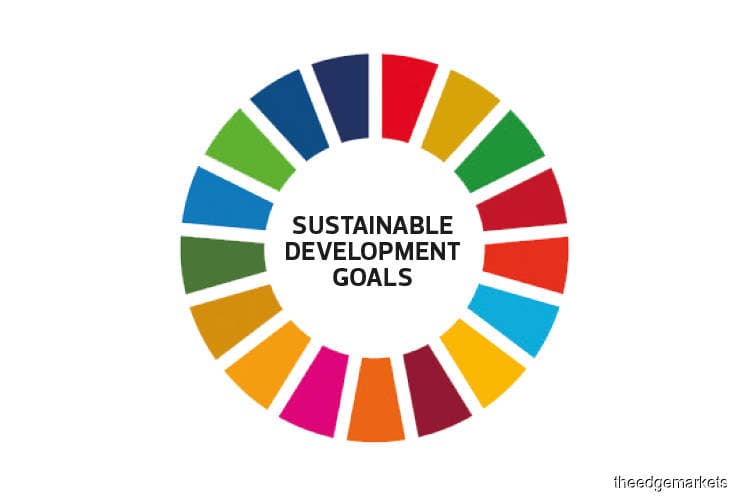
This article first appeared in Personal Wealth, The Edge Malaysia Weekly on February 10, 2020 - February 16, 2020
The popularity of the Sustainable Development Goals (SDGs) has spurred capital markets and businesses to reassess their operations and consider their impact on people and the planet. While this has been a huge step forward, as is typical, the less scrupulous have jumped on the bandwagon by whitewashing their activities to make it appear that they too have a positive impact on the benefits of the SDGs.
This has caused a new concern, that people are adopting these goals in a cursory manner, otherwise known as “rainbow-washing”. This applies to companies that issue inflated claims, seemingly advocating the multi-coloured SDGs mosaic — also known as the rainbow wheel — to help hide a track record of questionable behaviour or tepid commitments to action in order to enhance their brand.
The term was coined by Prof Dr Wayne Visser, professor of integrated value and chair of sustainable transformation at Antwerp Management School, to refer to companies that use the SDGs for their corporate PR spin. Before coming to be known as rainbow-washing, this exercise was referred to as SDG-washing.
Unlike green-washing — coined in the 1980s to describe outrageous corporate environmental claims — rainbow-washing was derived from the colours assigned to the 17 SDGs.
What are the SDGs?
Launched in 2015, the SDGs replaced the Millennium Development Goals and were adopted by more than 193 countries. At its crux, the 17 SDGs seek to realise shared prosperity and human rights for all — covering objectives that include action on climate change, gender equality and eradication of poverty — by way of encouraging global partnerships.
The Business and Sustainable Development Commission report, Better Business, Better World, found that achieving the global goals could open up an estimated US$12 trillion in market opportunities in four economic systems: food and agriculture, cities, energy and materials, and health and well-being. These categories represent about 60% of the real economy and are critical to delivering the SDGs.
If executed well, the advocates of the SDGs strongly believe that it is an opportunity for strategic re-orientation and widespread innovation as the goals also highlight the material risks that arise from prioritising profit maximisation and changing consumption habits that benefit the environment and communities.
What can be done to avoid rainbow-washing?
Risk-based due diligence is necessary to ensure that the misuses are nipped in the bud, say experts. Recommendations such as the UN Guiding Principles for Business and Human Rights and the OECD Guidelines for Multinational Enterprises can help define expectations, says Roel Nieuwenkamp, former chairman of the OECD Working Party on Responsible Business Conduct.
He notes that companies need to prioritise their efforts on where their negative impacts on the SDGs are most severe. “Ultimately, companies should do their due diligence on all SDGs to avoid undermining these goals. This is the essential baseline.”
There are also practical guides published by the Global Reporting Initiative, the UN Global Compact and the World Business Council for Sustainable Development that detail how companies could maximise their contribution to the SDGs.
Ultimately, incorporating the SDGs boils downs to the willingness of business to conduct themselves with integrity, instead of repacking existing commitments or only focusing on goals that are convenient to existing interests and initiatives.
How business sees the SDGs?
The kaleidoscope of good causes most certainly makes for alluring public relation exercises and marketing campaigns. By way of popular phraseology, businesses appear to be far more sustainable and responsible than they really are.
“Business responsibility for respecting human rights is too often viewed only as a matter of compliance and risk management distinct from initiatives seen as more innovative, leadership-oriented and transformative,” said a group of civil society movements in an open letter to UN Secretary-General António Guterres and the participants of the UN Private Sector Forum 2017.
The group — which comprises the Business & Human Rights Resource Centre, the Danish Institute for Human Rights, the Institute for Human Rights and Business, the International Corporate Accountability Roundtable, Oxfam International and Shift — pointed out that this mentality prevented business leaders from addressing their own adverse human rights impacts.
Case in point is the landmark suit launched in December last year against the world’s largest tech players — Apple, Google, Dell, Microsoft and Tesla — by Congolese families who say their children were killed or maimed while mining for cobalt used to power smartphones, laptops and electric cars.
While some of these companies tout improving energy efficiencies, which is in line with SDG 13, they now face accusations of aiding and abetting in the death and serious injury of children who worked in cobalt mines in their supply chain. If proven, these purported activities, among other violations, are a downright manipulation of SDG 8, which stresses decent work and economic growth.
Similar instances, where businesses ignore, cherry pick or spin the SDGs, are becoming increasingly prominent as the goals act as a useful catalyst when it comes to fundraising.
Save by subscribing to us for your print and/or digital copy.
P/S: The Edge is also available on Apple's AppStore and Androids' Google Play.